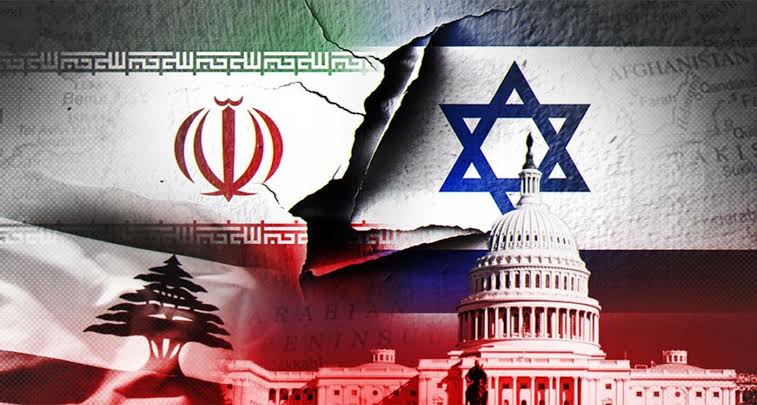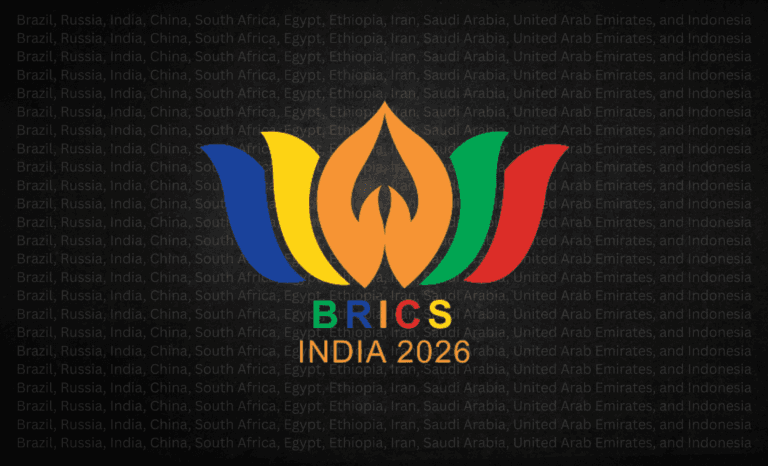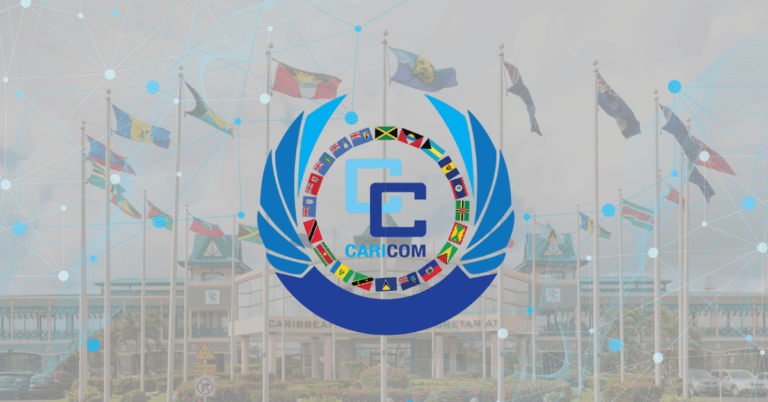Amidst the ongoing Russia-Ukraine and Israel-Hamas conflict, another new but old war emerged between Iran and Israel(The Iran-Israel Conflict). Although both the countries were engaged in an espionage war since the 1980s, this is the first time they have confronted each other directly in open warfare. What was once a covert Cold War fought between intelligence agencies that is Mossad and IRGC and other regional proxies like Hamas, Hezbollah now it is turning to a full scaled war. As the missiles are flying and the red line is getting thinner, many political scholars are suspecting this to be the beginning of the Third World War.
History of Iran-Israel Rivalry
The bitter relation that Iran and Israel presently have was not the case before the 1979. Iran was an ally of the Western front in the Cold War period. Iran was one of the few Muslim countries that recognize Israel’s sovereign status de facto(what is legally recognized) but not de jure(what exists in reality). Since both countries are non-arabian in a region where Arab majoritarian were dominating, they had quite a lot of mutual interests such as concerned about rising Egyptian leader Gamal Nasser whose Arabic rhetoric was viewed as a probable cause for regional instability by both Iran and Israel.
Under Reza Pahlavi, the then Shah of Iran, military, economic, and diplomatic ties were prospered between the two countries as both were Pro West. Israel was importing Iranian oil. Iran in return purchased Israeli military equipment, training, and agricultural technology. Israeli companies were active in Iran, and Israeli engineers helped in infrastructure and agricultural projects. Militarically also both countries used to share intelligence information, Iran’s secret police SAVAK received training and support from Mossad and the CIA during the Shah’s reign. Israel considered Iran as a crucial partner in their Periphery Doctrine, which emphasized building strong relationships with non-Arab countries such as Iran, Turkey, and Ethiopia to neutralize hostilities of Arab nations.
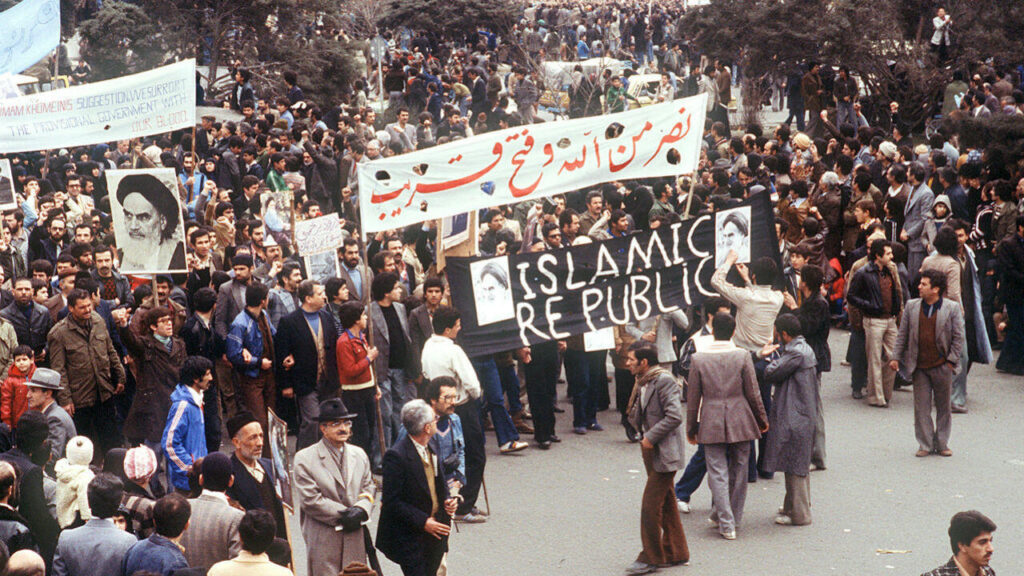
All of these years of meticulously cultivated strategic alliance between the two nations came to an abrupt denouement with a singular event The Islamic Revolution that took place in Iran in 1979 under the leadership of Rohullah Khamenei. Khamenei defenestrated the incumbent Pahlavi and took control of the power. After that, Iran completely severed all the ties with Israel and thus began ideological differences which later transmitted to proxy wars and most recently the ongoing face-to-face warfare.
Also Read: Balochistan: A Land of Riches, Betrayal and Resistance
Ideological Differences
Zionism is a political movement which translates to a rightful establishment of Jew state Israel in their original territory, the modern-day Israel that Jews consider their ancestral place. The Belfour declaration that the British government initiated in 1917 proposed a statement that supported the creation of a new home for the Jewish people in Palestine, which later became the crux of the Zionist movement, resulting in the creation of Israel in 1948. Since then Israel believed that it was their rightful habitat and their right to exist and they would do to any extent to preserve that.
The Iran under Ayatollah Khamenei is censorious of Zionism. Khamenei believed that it was a tool of Western imperialist to assert dominance in the West Asia(Middle East), he viewed it as anti-Islam. He considers Israel as an illegal occupier of Muslim land, often describing Israel as Shaytân-e Kuchak (Little Satan). On the other hand, Israel viewed Iran as the main sponsor of proxy groups like Hamas, Hezbollah, which is often involved in anti-Zionist activities inside Israeli territory which threatens Israel’s national security.
The Nuclear Question
This remains one of the most pressing and contentiousquestions today: whether Israel has rights to attack Iran in the guise of preserving their national interest, or if Iran has rights to acquire a nuclear arsenal. To label any of them as right or wrong is simply a wrong thing to do.
Although Israel has maintained a deliberative ambiguity regarding nuclear arsenal. They have never publicly denied or admitted having nuclear warheads but it would be dotish to believe that Israel does not possess any nuclear warheads. According to various credible sources, estimated 90 plutonium-based nuclear warheads are currently in the hands of Israel; these estimates have been nonconflicting for many decades. Israel is not a signatory to the Nuclear Non-Proliferation Treaty (NPT) and has not accepted the IAEA’s safeguards on some of its principal nuclear activities.
In November 2023, amid the Gaza war, the junior Heritage Minister Amihai Eliyahu publicly considered dropping a nuclear bomb over Gaza, which some took to be a probable admission that Israel does possess such capabilities but Prime Minister Benjamin Netanyahu reprimanded and suspended Eliyahu in response. So the big question about possession of Nuclear still hanging over Israel.
It’s widely believed that Iran does not possess any nuclear warheads till now but it has been a matter of speculation how close they are to developing one. Iran’s nuclear program began in the 1950s under the Pahlavi dynasty with US support. Iran is a signatory of NPT sinse 1968. It expanded in the 1970s with plans for power reactors, halted after the 1979 Islamic Revolution for some time and continued secretly since the 1980s Iran–Iraq War. Iran strongly put forward their statement that their use of Nuclear energy is only for civilian purposes but amidst all. These claims of undeclared enrichment sites at Natanz and Arak were exposed in 2002.
In 2003 Iran suspended their previous nuclear programs and claims to use it only for peaceful civilian purposes but again comes under scrutiny when another underground fuel enrichment site Fordow was revealed in 2009. It is to be believed that Iran is currently enriching uranium to 60% purity, and has been accelerating its nuclear advancements by installing more advanced centrifuges but how much percentage of purity they are acquiring is still a matter of speculation. But one thing that is certain that Iran’s nuclear programs are constantly under the scrutiny of IAEA but still it is difficult to say whether Iran currently actively pursuing the enrichment program or not since Iran limited the access of IAEA. In 2023 IAEA Director General Rafael Grossisaid “We have not seen any evidence that Iran is actively pursuing a nuclear weapon. But Iran’s lack of transparency and accumulation of highly enriched uranium is a serious concern.”
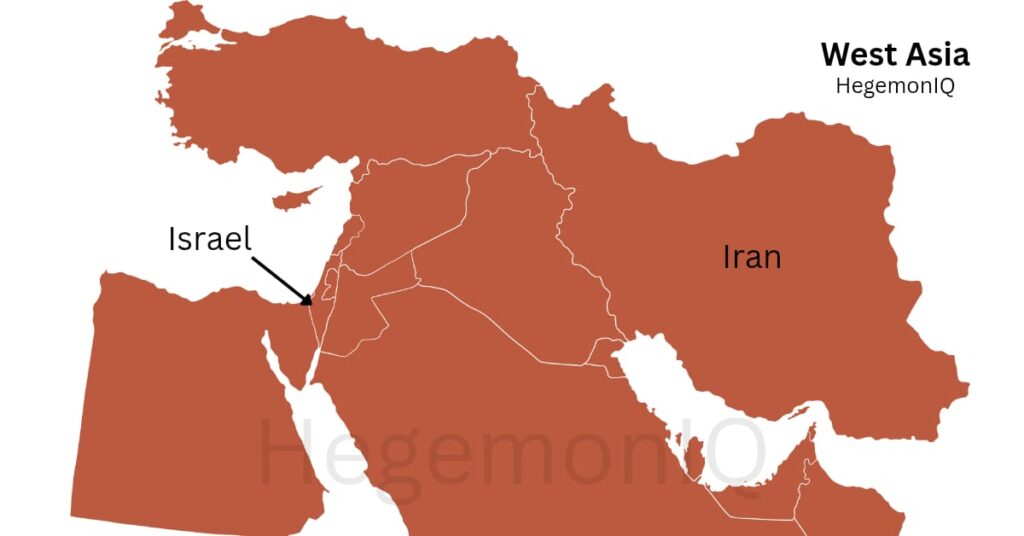
Also Read: Economic Sanctions In US Foreign Policy: Effectiveness, Ethics, And Consequences
Global Power Play
The Iran-Israel conflict is not merely a matter of the West Asia(Middle East) alone; It can also be viewed as a global chess game between other Superpowers such as the US, China. Each of these major powers has a stake in this war. Below, I will try to exhibit some of them.
Israel has been America’s closest ally and key to the West Asia’s internal affairs since its birth. Both Country shares mutual concerns against the Islamic regime of Iran and other West Asia war-torn countries. Both America and Israel share secret intelligence information and have cooperated in defence programs like the Iron Dome and the Advanced missile system. These are some reasons among many why the US has a perennial relationship with Israel.
Another plausible reason is the strong pro-Israel lobby in US domestic Politics, which is the American Israel Public Affairs Committee (AIPAC). On the other hand, Iran poses a threat to America’s influence over the West Asia, for example, Iran’s anti-West rhetoric, sponsoring non-state actors and natural geographical control over the Strait of Hormuz that can disrupt global Oil flow. Due to all these factors, the US needs to contain Iran. This is why the US attacked Iran’s Fordow nuclear site, dropping 30,000 pound bunker-buster bombs over the mountains covering this site.
Since the Assad regime’s fall and the ongoing war with Ukraine, Russia’s grip has been loosened over the West Asia. Since the newly formed Syrian government ousted Bashar al-Assad, Russia is struggling to exert influence in this region. Russia and Iran are both Oil and gas powers that work through OPEC. Russia also sells advanced weapons, arms to Iran. So Iran is very much in Russia’s interest for counterbalancing the US. On the other hand, Russia also maintain a balanced approach with Israel due to the large Jewish diaspora that lives throughout Russia, and other geopolitical factors also play a role. The main motive of Russia is to take advantage of instability and weaken US influence while selling arms and other military equipment to US adversaries.
Another global giant, China, is closely monitoring the issue. China condemned the recent US attack on Iran. Iran has been a key oil supplier to China. Iran is also a key partner of China’s Belt and Road Initiative (BRI) and signed a multi-billion-dollar investment agreement with Iran. Another key factor of China’s staunch relationship with Iran is to neutralise US influence in that region since both share an anti-West view.
For the EU, Iran matters because the EU’s alternatives to Russia’s gas. A destabilised Iran might send refugees and extremism to Europe.
Iran is one of the closest paerner, so a War with Iran directly affects India. The Chabahar Port is the most important strategic and economic investment of India in Iran. If the Strait of Hormuz gets closed, then India will face huge operational disruptions. The investment in Chabahar’s Shahid Beheshti Terminal, which is viewed as an alternative to Pakistan’s Gwadar, and a gateway to the International North-South Transport Corridor (INSTC). Rising conflict would surely jeopardise India’s logistics infrastructure, connectivity projects, and geopolitical goals in the region.
Also Read: Indo-Pacific Geopolitics: Exclusive Insights from Carlyle Thayer on Regional Dynamics and Strategy Challenges
Casualties in the Iran-Israel Conflict
As of 23 June till the ceasefire was announced, according to HRANA Report, almost 895 Iranian people have succumbed to death, including 215 military members, 363 civilians and 287 unidentified, with over 3396 injuries. Significant structural damage, such as buildings, military bases, nuclear facilities, and energy infrastructure, occurred. On the other hand, up to 29 Israeli citizens died and 592 were wounded by Iran’s missile attacks. 240 residential buildings, the Soroka medical facility has been damaged by the attacks. Thousands of people have been displaced from both fronts.
Conclusion
Amid this quagmire(Iran-Israel Conflict), it would be foolish to predict anything. While almost completing the writing of this article, another new news came that Iran attacked a US base in Doha, Qatar, in retaliation, which made me rewrite the denouement of this article. Immediately after Iran’s attack, President Trump announced a ceasefire between Iran and Israel. It’s been confirmed that both countries agree to the ceasefire, but still, both are blaming each other for violating the ceasefire. President Trump rodomontaded about this historic ceasefire, but as new reports have found, the US strike set back Iran’s Nuclear Program by only a few months. Classified intel indicates that the attack sealed off the entrance to two facilities but did not collapse their underground buildings. President Trump, in his recent media appearance, appeared visibly displaced as he made strong remarks, even using explicit language, including the F-word.
The dynamic shifting of present global politics is occurring to such an extent that it is almost impossible to predict what will happen next. The only plausible solution to stop it permanently lies in ensuring both Iran and Israel suspend their nuclear activities and reach a diplomatic accord, but again, from a logical point of view, it is very much unlikely to happen. So we have to see what lies further ahead of this ceasefire and whether the UN and other global powers will be able to put the brake on it permanently, or is this merely a continuation of the familiar cycle of unrest that has long defined the West Asia?
About the Author: Maucham Talukdar has completed his graduation in Computer Science and is currently pursuing a career in Civil Services. He has a keen interest in global politics and public policy. Views are personal. Contact: talukdarmaucham121@gmail.com.
(For SEO purpose: Iran-israel conflict Iran-israel conflict Iran-israel conflict Iran-israel conflict Iran-israel conflict Iran-israel conflict Iran-israel conflict Iran-israel conflict Iran-israel conflict Iran-Israel Conflict Iran-Israel Conflict Iran-Israel Conflict Iran-Israel Conflict Iran-Israel Conflict Iran-Israel Conflict)

